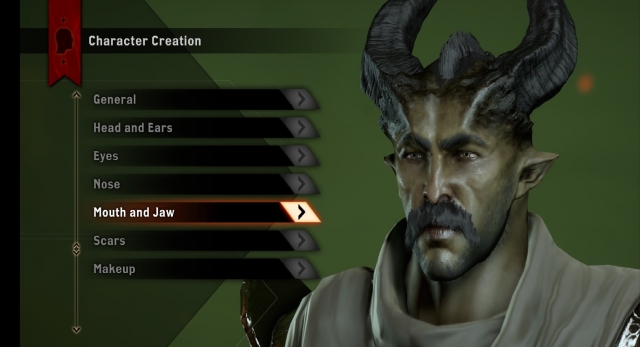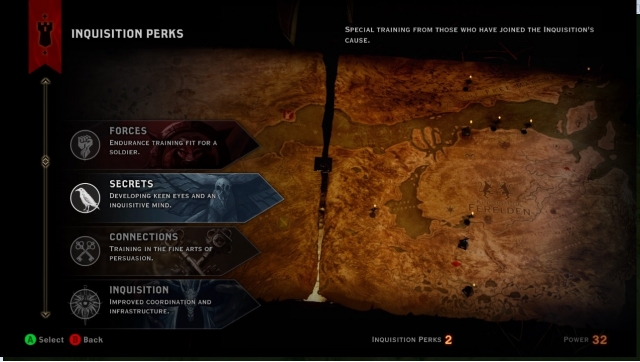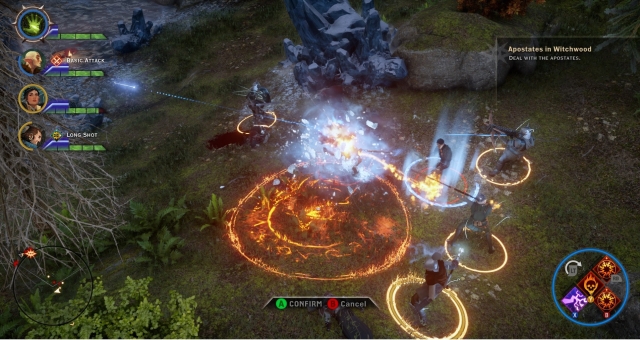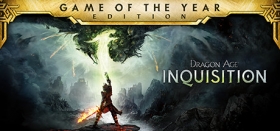Dragon Age: Inquisition Review
After a mere three and a half years of waiting (or 1,282 days but who's counting?), BioWare finally delivered on their promise of Dragon Age: Inquisition, the third game in the Dragon Age series, and boy, did they deliver.
Dragon Age II ended with a bang--quite literally. One of the player’s party members blew up Kirkwall’s Chantry (the Thedas equivalent of a church), jumpstarting a revolt among the city’s mages. That revolt turned into a full-blown civil war across the continent of Thedas, and at the start of Inquisition, it appears that any hope for a peaceful resolution has been lost.
The game opens with the player character in something called the Breach--a giant hole that has opened in the sky, tearing apart the world and letting demons and spirits through in the process. Fun stuff. From here, players can customise their character with the Inquisition’s vastly improved character creation system.
Gone is the weirdly dramatic lighting of Origins and DA2 that made picking colors and details a luck-based process. Instead, we have (gasp) overhead lighting (that’s admittedly sort of greenish but hey, can’t win ‘em all) and a enough sliders to more than satisfy my need for customisation. Inquisition’s creation process is exceedingly painless--not that I’ve ever really had a bone to pick with BioWare on the subject anyway--and the results are great, even on a PlayStation 3.

One stunningly attractive Qunari mage Inquisitor later, and I’m ready to stop a war, close the Breach and do anything else the game feels like throwing at me which, spoiler alert, is a lot. Before release, devs were boasting that Inquisition could take completionists 200+ hours to finish, and it’s easy to believe. Maps are sprawling, with a veritable pile of side quests to match. Inquisition may have taken its sweet time in getting here, but it’s an increasingly understandable development time the more I delve into the game.
Inquisition’s conflicts take place across Thedas, namely in the countries of Orlais and Fereldan, and the game does an impressive job of capturing the sheer scale of these struggles. Quests quite literally send you from one side of the continent to the other, and Inquisitors must juggle the demands of political forces as well as military ones.
The game’s story is equally immense. In Inquisition, the pieces from Origins and Dragon Age II come together to form a powder keg situation that makes pre-WWI Europe look tame in comparison. Story has always been one of BioWare’s strong suits, and this case is no different as the studio certainly doesn’t skimp on the drama and high stakes. But Inquisition’s pacing is where the game, at times, seems to stumble.

Things like the Breach and the mage-templar civil war, which have been built up as nigh-insurmountable tasks, are resolved almost too quickly and neatly. In fact, both of those issues are by and large solved before the game’s halfway point. And while what follows after isn’t exactly a one-eighty, it does feel almost like a bait-and-switch. But despite that, Inquisition’s story is still compelling and ultimately delivers emotionally on what fans have been waiting for.
As with the previous two games, the companions--referred to as the inner circle in Inquisition--and the newly-introduced advisers are all compelling, nuanced characters. Aside from their combat skills, each party member brings their own unique perspectives on events and player decisions. Interestingly, the dev team chose to remove the companion approval gauges this time around; instead of being able to check a score to see how much inner circle members like or dislike you, players must intuit where they stand by how characters react to them.
Romance is also more intuitive in Inquisition. Players are free to flirt with just about anyone--regardless of whether or not they’re actually interested in your Inquisitor or even available for romancing. That said, the game’s romance options feel more nuanced than in previous installments; Inquisition introduces the series’ first gay and lesbian characters, Dorian and Sera, and “race-gated” romance options--characters who are only available to Inquisitors if they’re a particular one of the game’s four playable races.
Inquisition also allows players to romance two of their advisers; Josephine, who handles the Inquisition’s political ties, and Cullen, a former templar from the previous games who oversees the troops. Outside of romance, the advisers, unsurprisingly, advise the player on how to deal with situations and provide perspective on conflicts.
They also handle missions from the War Table (which functions similarly to Mass Effect 3’s War Assets), gaining and spending influence to access new areas, missions, agents or resources. Although better integrated, like War Assets it ultimately feels like a mechanic that doesn’t add or detract very much from the game’s experience, which is still primarily focused on party combat and player choices.

Combat-wise, Inquisition feels quite similar to Dragon Age II. The introduction of tactical mode, which pauses combat to issue orders to party members, adds a nice new layer of control for players, which is especially handy when the AI has party members doing something useless. Outside of that, BioWare didn’t bother to fix what wasn’t broken, and fans of the series’ combat systems are likely to enjoy Inquisition’s to a similar degree. In a similar vein, the addition of mounts is handy given the size of the game’s maps, but otherwise not overly notable.
Unfortunately, Inquisition suffers from that same plague as so many other AAA titles: release day bugs. While not as crippling as Watch_Dogs, it’s frustrating to see bugs and glitches early on in things like the main quest line and dialogue mechanics. But aside from being forced to restart my PlayStation 3 once or twice (which admittedly may be a sign of its age more than anything else) the bugs were more cosmetic than anything else and had no real effect on actual gameplay.
Bugs aside, Dragon Age: Inquisition more than delivers on the promises of its devs. With beautiful graphics, sprawling maps and a detailed, compelling storyline, Inquisition improves on Origins’ and DA2’s weaknesses while keeping what made them so replayable. There is a huge sense that player choices, even on seemingly minor side quests, matter and make a difference in the fate of Thedas. Inquisition introduces a sense of scale that DA2 in particular lacked at times, and drives home the outcomes of choices through companion reactions and literal changes to the game’s map. Like its predecessors, its easy to see Inquisition being a game I’ll happily return to again and again.
Dragon Age Inquisition (Reviewed on PlayStation 3)
Excellent. Look out for this one.













COMMENTS
Guest - 12:07am, 4th January 2015
While I greatly appreciate FINALLY seeing the first 'official' review of DAI for the PS3, your comments are GREATLY at odds with the vast majority of user comments I have read for the PS3 version regarding the graphic quality and crashing/freezing. DAO was my favorite game of all time and the first that I platinumed (though I accept that not everyone put the effort into understanding the not THAT complex combat system to realize its greatness). DA2 was a rushed out hack job, the game that taught me NEVER to pre-order again. From what I can tell, DAI is more DA2 than DAO, which I expected. If it weren't, I'd likely willingly suffer through the ISSUES. Thanks nonetheless for not abandoning the PS3, like every other review site appears to have done.